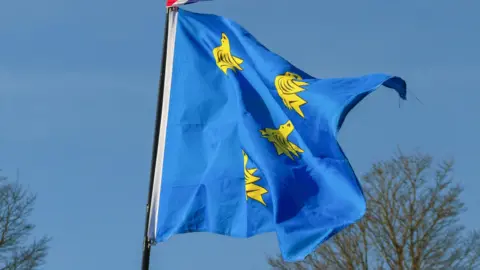Plans for mayor of Sussex and fast-track devolution
 Getty Images
Getty ImagesThe first full working week of 2025 is set to be a historic one for Sussex.
It's likely councillors will agree on Thursday to push forward plans to create one strategic authority to govern all of East Sussex, West Sussex, and Brighton and Hove.
By Friday, it's expected they will apply to the government to scrap county council elections due to take place this May, which will put them on a fast track to preparing to elect members of a new authority – and a mayor of Sussex.
The government said regional mayors would "drive economic growth" and devolution would "unleash power from Whitehall back into local communities that know their areas best".
Sweeping changes
This move would bring about sweeping changes to the way local services like planning, transport, education, social care, policing and waste are run.
Since 1889, Sussex has been divided into two administrative counties of East and West Sussex. In 1997, Brighton and Hove established its own unitary authority.
A new mayor and strategic authority would serve a population of around 1.74 million residents.
Government plans suggest a deputy mayor would take on responsibility for policing, meaning the role of Sussex Police and Crime Commissioner would be likely to go.
Fast-paced plans
This is all happening at a fast pace. It's less than four weeks since the government published its plan for a 'devolution revolution', and that period included time off for Christmas and New Year.
Despite submitting conflicting bids for devolution last year, leaders of East Sussex County Council, West Sussex County Council and Brighton & Hove City Council now say they've reached a consensus that an elected mayor for Sussex would unlock significant powers and resources and ensure Sussex has a strong voice representing its interests with national government.
Each authority will hold an extraordinary meeting on Thursday morning to ratify plans to submit a collective proposal to the government to be among the areas entering the Devolution Priority Programme, aimed at rapidly setting up the new combined authority by next May.
Smaller parties' disappointment
While there appears to be consensus among our three upper tier councils, for the 12 borough and district councils across Sussex, their future is very uncertain. They are due to be abolished.
The Green Party, Liberal Democrats, Reform UK and other small parties and independents are disappointed about the plans.
They had hoped to capitalise on the failing fortunes of the Conservative Party, which controls both East and West Sussex county councils, by challenging their seats in elections this May.
Instead, they could be about to lose the power base they've built up in recent years, which now sees councils in Hastings, Lewes and Wealden with Green leaders and a Liberal Democrat at the helm in Arun, Chichester, Horsham, Mid Sussex and Eastbourne. Rother has a leader from a residents' association.
When the three upper-tier authorities make a decision on Thursday, it will be at special meetings of their cabinet, not the full council, meaning only Labour councillors in Brighton and Conservative councillors in East and West Sussex will have a say.
More detailed criteria for local government reorganisation is expected to be sent to all councils in the next few months, followed by a government-led consultation on reorganisation proposals.
There are outline plans for three new lower-tier councils to be created roughly matching the existing Brighton & Hove, East Sussex and West Sussex boundaries.
Follow BBC Sussex on Facebook, on X, and on Instagram. Send your story ideas to [email protected], or WhatsApp us on 08081 002250.
